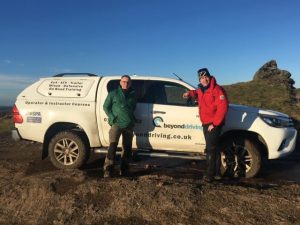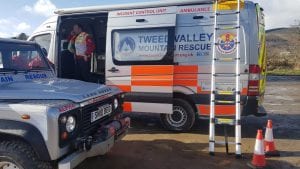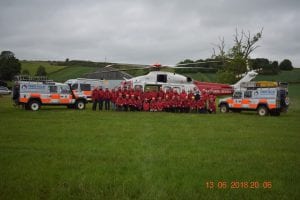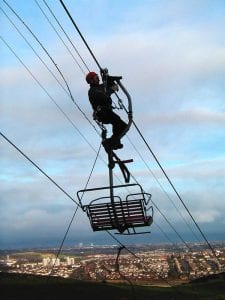Volunteering for Mountain Rescue: An employee and employer perspective from Scottish Water

Volunteering for Mountain Rescue: An employee and employer perspective from Scottish Water
Alyson MacDougal Masson talks to Tweed Valley Mountain Rescue Team (TVMRT) member Ray Smith about what it’s like to manage volunteering whilst also working full time for Scottish Water as a Skills Academy Instructor, and to Gillian McFarlane of Scottish Water about what it means to have a member of staff who is also part of a voluntary Mountain Rescue Team (MRT).
Mountain Rescue team members are all volunteers with many having ‘day jobs’ and other responsibilities that they frequently have to manage with the demands of their respective teams.
Employers who have a member of staff who expresses a wish to volunteer or who are interviewing for a new member of staff who explains at interview that they are a member of an MRT may be concerned about the impact on their business and employee availability. Unlike some volunteering it does not have set hours or predictable requirements, the calls for assistance can come fast and furious at any time of the day or night or there can be periods of calm where call outs are rare. This unpredictability can worry employers, particularly if the volunteer has a key or critical role in the organisation. It seems, at first look, that employers may be worrying unnecessarily. The very skills critical to MRT volunteering can assist the employee to manage the requirements of work and volunteering.

I recently spoke to an experienced team member, Ray Smith who has been a volunteer with the Tweed Valley team since 1997. Ray currently works for Scottish Water as a Skills Academy Instructor. Ray’s own line manager and Scottish Water’s Head of Communication kindly provided their perspective from an employer’s point of view which provides a fuller account of employing SMR volunteers and the benefits and challenges of doing so.
Tweed Valley are a mountain rescue team which covers approx. 2,500 sq. miles, whilst the terrain does not include the very highest of mountains it does include challenging rivers, Corbett’s, and other topography. They have around 44 volunteers and receive circa 30-60 call outs per year and these include a large percentage of mountain bike or horse-riding incidents as well as missing people and off course rescue of unwell or injured hill walkers and climbers.

The team are spread across the area to ensure effective use of resources and to expedite their ability to be on scene providing aid across their area. They have a base in Melrose, Galashiels Fire Station and Peebles. This allows them to respond quickly to call-outs across the Tweed Valley team area.
Ray is an experienced member of the team and is active in team business, training, resilience planning, kit checking, fund raising and educational visits to schools etc. Fundraising is a continued focus for the team. Whilst some funding is provided centrally and topped up via SMR, there is still a shortfall to be made up each year to ensure kit can be replaced. The kit is subject to continued use in all conditions and wear and tear requires replacement of various items, all adding to the costs of providing the service. To take advantage of innovative solutions which become available to improve rescue and safety (always a priority) and assist those who call-out mountain rescue, also requires constant fundraising.
When Ray was asked how me balanced work with volunteering, he explained that most of the communication with his employer is held locally with his line manager. He stressed that it is vital to have an open conversation with your manager and to some extent colleagues to ensure they understand the demands volunteering creates and also appreciate that Ray doesn’t have to go out on every call that Tweed Valley receive. Work can and does take precedence when there is a requirement for Ray to be in attendance and this cannot be delegated or re-scheduled. Some volunteers with mountain rescue who are in roles with the fire service for example, cannot attend a call-out whilst on shift and confine their volunteering to their free time or rest days. This is the first point that an employer who has employees who volunteer or wish to should understand. The employee will not be expected to attend every incident or call out. Ray explains that he has built up a relationship built on trust with his manager and he will assess if he can attend a call-out or not based on current workload and then inform his manager. As a trainer there are times when Ray is scheduled to deliver training etc where he cannot attend however if he is tackling admin or other similar activities he can re-schedule this and accept the call-out.
communication with his employer is held locally with his line manager. He stressed that it is vital to have an open conversation with your manager and to some extent colleagues to ensure they understand the demands volunteering creates and also appreciate that Ray doesn’t have to go out on every call that Tweed Valley receive. Work can and does take precedence when there is a requirement for Ray to be in attendance and this cannot be delegated or re-scheduled. Some volunteers with mountain rescue who are in roles with the fire service for example, cannot attend a call-out whilst on shift and confine their volunteering to their free time or rest days. This is the first point that an employer who has employees who volunteer or wish to should understand. The employee will not be expected to attend every incident or call out. Ray explains that he has built up a relationship built on trust with his manager and he will assess if he can attend a call-out or not based on current workload and then inform his manager. As a trainer there are times when Ray is scheduled to deliver training etc where he cannot attend however if he is tackling admin or other similar activities he can re-schedule this and accept the call-out.
In the Tweed Valley team area, most calls out are either in the evening or at weekends, when the hills are busier as people make the most of their free time. During the recent pandemic, the team has continued to provide service, with changes to their processes and approach to ensure team members and the pubic are COVID-19 safe. The restrictions in place to stop us travelling during the various lockdowns are balanced out by more people taking to the hills for exercise, recreation or perhaps to manage their mental health, so numbers of callouts are similar to expected. These ‘out of hours’ call-outs provide a different problem for volunteers. Whilst Ray would be available during the day for work, if he had been out on a call the previous evening, he will be suffering from lack of sleep as a minimum. Ray says that, again, this is worked out locally, with perhaps a later start for work to accommodate him getting some rest. Mostly, he continues, unless it has been an involved or traumatic call-out, he just gets on with it and works his normal day, catching up on rest when he can. It is good for him to know however that the flexibility from his employer is there should he need it.
It seems that the requirement to be away from work for a SMR volunteer may not be as significant as many employers may think.
Being a volunteer brings other skills to the workplace which are valuable. Organisation, team working, first aid, dealing with people in difficult or traumatic situations, excellent communication and problem solving to name just a few, are all skills which volunteers must possess. And whilst some will be stronger in some areas than others, the fact that the volunteers possess such skills is a bonus to their employers.
Ray’s line manager, Gillian MacFarlane confirmed this point during my conversation with her. When she interviewed Ray for his current role, he was already a volunteer with the Tweed Valley team. Gillian said that she still remembered his interview clearly, and that she had quickly seen the value of some of the additional skills Ray would bring to his training role. These included being comfortable talking to stakeholders, designing, and delivering training and first aid. Gillian did not have any concerns about how Ray’s volunteering may impact his performance at work, due mostly to the fact that Ray was open about it at interview and put her mind at rest by dealing up-front with any challenges. Gillian was impressed by the knowledge and different ways of working that Ray acquired as a volunteer in areas such as dealing with COVID and mental health at work. Some of this fed into pieces of work at Scottish Water and provided a broader perspective in discussions and planning sessions to deal with these and similar issues. When asked if she had ever experienced any issues with Ray volunteering or been aware of any issues his colleagues may have had, Gillian confirmed that she personally had not, and was not aware of any of Ray’s colleagues who had any concerns. Ray manages the relationship with his colleagues well and whilst sometimes there are things which Ray cannot discuss with them because of confidentiality, they are interested in his volunteering and continue to display a supportive and positive attitude to it.

If there were more volunteers within her team this may provide a logistical issue for Gillian. However, her approach would remain the same and a local resolution would be found, with the volunteers themselves taking the lead in finding solutions to any arising issues. Work does take precedence however and this local, open communication seems to work well to balance the needs of both Scottish Water and SMR.
Scottish Water operates a successful scheme which provides more than 4000 employees with two paid days a year in which they can volunteer in a variety of activities and with a number of organisations ranging from beach and park clean-ups to school inputs about the water cycle and with charities. As a result of the pandemic, however, the volunteering programme was paused to help keep people healthy and safe.
Some employees undertake their own volunteering activities, based on their interests and pursuits outside of working for Scottish Water. As well as mountain rescuers, employees volunteer with the Royal National Lifeboat Institute, the territorial army and even as a motorcyclist delivering blood supplies for a charity associated with the NHS.
Further consideration is being given to enhancing the volunteering programme once it can resume post-restrictions, including celebrating the efforts of employees who do their own volunteer activities such as mountain rescue.
In summary having an employee who volunteers for Mountain Rescue does require good communications and clear parameters as to what is and isn’t possible depending on the individual’s role and the size of the organisation. However, it is workable and can being positive benefits to the organisation through additional skills, knowledge, and learning. So, if one of your employees or future employees expresses an interest in volunteering, put the kettle on, sit down with them (virtually these days) and have an open exploratory chat. You may be surprised at what’s possible.
Some further information on how an employer might help support a volunteer responder can be found on the Lifelines Scotland website here: https://www.lifelines.scot/volunteers/i-employ-a-volunteer-responder